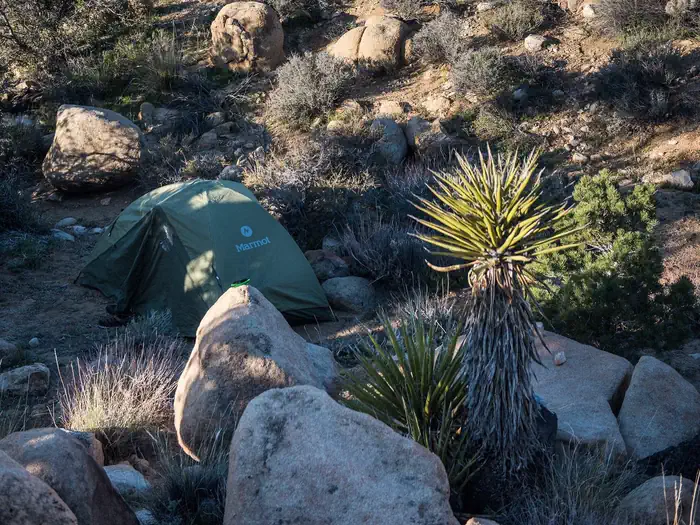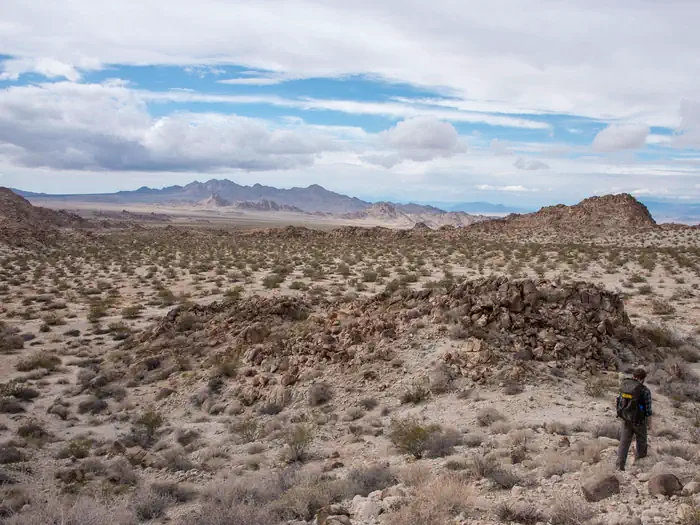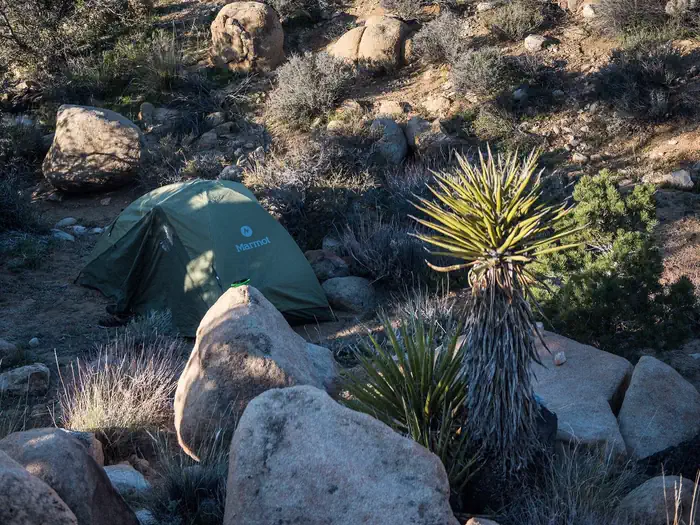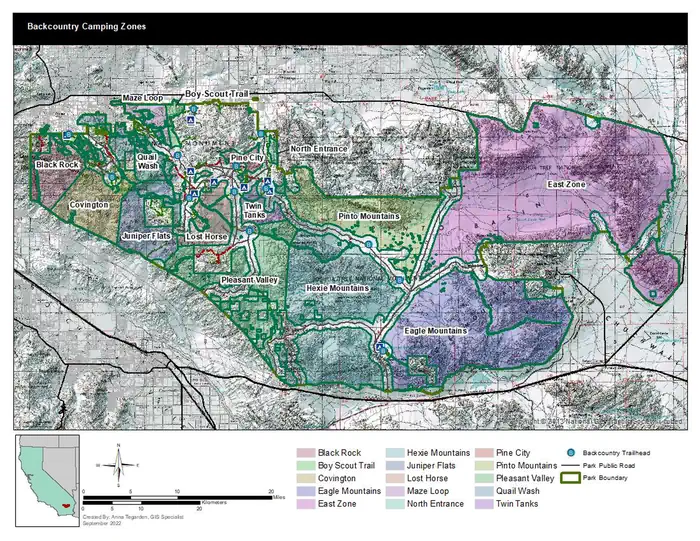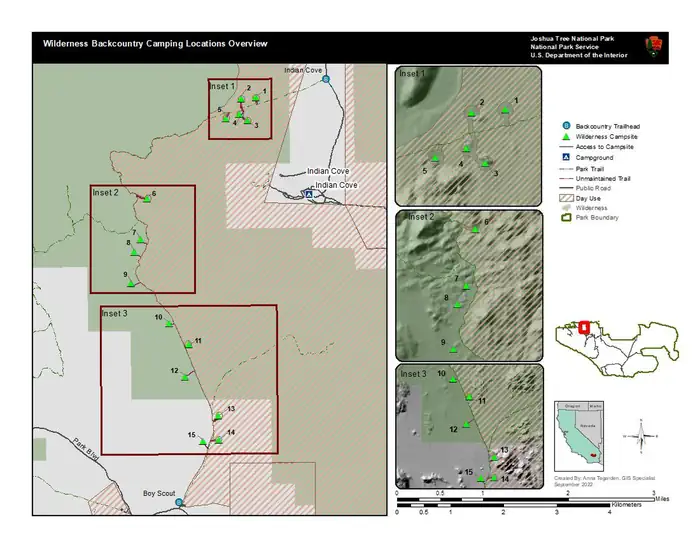Joshua Tree National Park Wilderness Backpacking Permits
Joshua Tree National Park is a vast wilderness covering more than 792,000 acres of the Mojave and Colorado Deserts in Southern California. Of this approxiately 1200 square miles, roughly 85% is managed as wilderness. Ranging in elevation from less than 1000 ft at the park’s eastern boundary to over 5800 ft atop Quail Mountain in the heart of the Little San Bernardino Mountains, this park offers a variety of landscapes and unparalleled opportunities for unconfined, primitive recreation. Higher elevation sites offer sweeping vistas of steep canyons and rocky, exposed summits, expansive Joshua tree and juniper woodlands, as well as the park’s famous monzogranite outcroppings dotted with pinyon pine. Lower elevation sites along the eastern margin of the park offer the opportunity to study vast landscapes of playas, washes, sloping bajadas, and microphyll woodlands. The immense depth of geologic time is visible in the formation of desert varnish on long-exposed rock faces and in small cryptobiotic soil crusts tenaciously clinging to life in the bottom of vast sandy basins.
Overnight, wilderness backpacking can be accessed from any of 13 backcountry trailheads scattered throughout the park [Wilderness Backpacking ]. These trailheads are accessible through a network of paved and unpaved roads. Most of these areas are accessible by paved roads, although high clearance 4x4 vehicles are needed to access Upper Covington, Geology Tour Road, and Pleasant Valley backcountry trailheads. Roads may be temporarily impassible due to flooding or snow.
The park is divided into 13 backcountry zones . When making your online reservation, please indicate the zone in which you intend to camp each night. Boy Scout Trail is the only zone in which it is required to camp in designated sites. If planning to only hike the Boy Scout Trail and not enter other zones, please select a specific designated site along the Boy Scout Trail. In contrast, parking locations are designated under entry/exit point during the check out process and should match one of the 13 backcountry trailheads, unless entering the wilderness from outside the park boundary (e.g. along CA-62 east of Twentynine Palms).
Cell service is spotty or unavailable throughout much of the park, and visitors should carry alternative forms of communication (spot devices) and make all necessary phone calls before entering the park. Potable water is available at Cottonwood Campground, Park Headquarters and the Joshua Tree National Park Visitor Center (in Twentynine Palms), Black Rock Nature Center (Yucca Valley), Indian Cove Ranger Station, and the West Entrance. Gas and other services are not available anywhere inside the park and may be obtained in the towns of Twentynine Palms (outside the north Entrance), Joshua Tree and Yucca Valley (outside West Entrance), or Indio (outside the South Entrance). Although distances may appear short on the map, it can take up to two hours by road to travel across the park.
Permit & Season Information
Permits are required for ALL overnight, wilderness backpacking trips. Day-use visitors do not need to register.
- Online same day permits will be available through recreation.gov up until 11:59pm on the day of departure. In person same day permits will be available up until 4pm at the permit office located at 74485 National Park Blvd, Twentynine Palms, CA, 92277, Bldg. 100; Everyday, 8:00am - 4:00pm. Permits may be subject to change based on demand and staff availability.
- Permits for all zones, including Boy Scout Trail designated sites, can be obtained up to 6 months in advance through Recreation.gov.
- Backpackers along the Boy Scout Trail must camp in one of 14 designated campsites.
- Camping in other zones is 'at large' and visitors may choose their own low-impact site. 'At large' camping must be 1 mile from any Backcountry Trailhead, 1/2 mile from a legally open road, and 200 feet off a trail.
- Camping in or near rock shelters or in designated “day-use only” areas is strictly prohibited.
Need to Know
Download the NPS app prior to visiting the park – trail maps and more!
You are responsible for knowing and abiding by all park rules and regulations and your own safety! Plan and Prepare!
- Wilderness travel carries inherent risk. Understand the limitations of your group when planning a wilderness backpacking trip. The park’s backcountry is rugged and subject to adverse weather conditions.
- Permit holders are required to carry a digital or printed copy of their permit or confirmation email at all times.
- Wilderness backpacking is limited to 3 consecutive nights within a specific campsite or backcountry camping zone and may not exceed 14 days within a season.
- A park entrance pass [physical or digital; Park Passes ] is required to access all backcountry trailheads, unless parking outside of the park. If starting your trip outside the park (i.e. to access the Coxcombs), please contact public lands agencies responsible for those areas.
Planning and Registration Process
- Watch the required video in order to minimize your impact during your trip. Please consider your group’s skill level and experience in desert conditions. For questions or help planning, contact the Joshua Tree National Park permit office at (760) 367-5554.
- Review the zoning map and trails associated with each zone. To help rangers respond in emergency, PLEASE INCLUDE YOUR ITINERARY IN THE COMMENTS BOX. Many zones do not have maintained trails, however wilderness backpacking is allowed off trail. Camping regulations of 1 mile from any backcountry trailhead, 0.5 miles from any road, and 200 feet off any trail apply in all areas of the park unless camping along Boy Scout Trail in a designated site. Camping in day use areas is prohibited.
- During check out, the entry/exit selections are where you will park your vehicle, i.e. the name of the Backcountry Trailhead. These are not the zones in which you intend to camp. See here for assistance.
- Once you confirm your trip through Recreation.gov, you will receive a confirmation email with your trip details. Based on staff availability, you may receive a follow-up phone call following completion of your reservation on Recreation.gov
- Violations are subject to citation and may result in your permit being revoked.
Vehicles and Parking Information
- No parking permit is required for vehicles parked overnight at one of the 13 backcountry trailheads. Vehicles are limited to 2 per permit. Parking vehicles at two different parking areas for the same trip is allowed.
- Certain parking areas are limited both in terms of the number of available spaces and vehicle size. Please be considerate of other visitors when planning your trip.
- Improperly parked vehicles (blocking roadways or on top of vegetation) may be subject to citation or towed at owner’s expense.
Food and Water Storage
- Water is the limiting factor for any trip in JTNP. When surface water exists, it is reserved for park wildlife. Please carry or cache all water you plan to use.
- All caches must be marked with name, contact information (phone number / email), and dates of intended use.
- Caches must be removed at the conclusion of your trip. Use sturdy containers which cannot be easily damaged by park wildlife.
- Food must always be stored properly when not attended.
- Although bears are not a concern, smaller animals such as mice, ravens, and coyotes are known to try to access human food and water caches.
- Human food is harmful to wildlife and habituated animals are at greater risk of becoming aggressive or being killed. Although not required, please consider carrying food in a wildlife-proof storage container such as a bear bin.
Human Waste
- Human waste must be buried in “cat holes” six to eight inches deep and at least 200 feet away from water sources. Do not bury human waste under rocks or in alcoves.
- Pack out used toilet paper. Do not leave used toilet paper or exposed excrement in the backcountry.
Fee Policy
- There is a $6.00 non-refundable reservation fee for all wilderness backpacking permit reservations in Joshua Tree National Park.
- One wilderness backpacking permit is valid for 1-12 people. Group sizes of over 12 are prohibited, unless specifically approved by the permitting office.
- All commercial user groups are required to follow the same guidelines as non-commerical users.
- All payments must be made electronically through Recreation.gov. In-person payments by credit/debit card only will be accepted at the permit office for same day and advanced permit reservations. Cash payments are not accepted. Payments cannot be made over the phone.
Cancellation Policy
Cancellation Policy
The $6.00 reservation fee is 100% non-refundable, including for cancellations made prior to the 24 hour cancellation window. Under no circumstances will a refund be given for a cancelled, modified, or completed permit.
Change Policy
- Changes may be made to your reservation, including exit date, entry/exit locations, designated site selection, and zone selections as late as one day prior to your permitted entry date. No follow up is required with park staff.
- To change an entry date, you must cancel the permit and reserve a new permit. All fees apply.
- One alternate trip leader may be designated at the time of reservation. The trip leader and alternate trip leader may not be changed and must be present for the permit to be valid.
- Campsites along the Boy Scout Trail and camping within the Pine City Backcountry Zone are limited and likely to be competitive. Please be courteous and notify the park as soon as possible if you decide not to use your reservation.
Contact Information
Mailing Address
74485 National Park Blvd Building 100 Twentynine Palms CA 92277
Phone Number
760-367-5554
